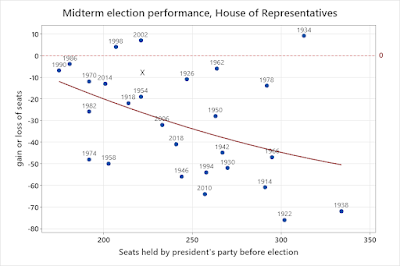A few weeks ago, I had a post on opinions about whether the Supreme Court should consider public opinion when making decisions. There was a strong relationship to education: more educated people are more likely to say that it should just consider the legal issues, while less educated people are more likely to say that it should consider what the public thinks. There's a similar question that applies to elected officials--should they do what their constituents want, or should they use their judgment about what is in the best interests of their constituents?
Although this is a classic issue in political theory, I could find only one relevant survey question, from 1993: "When your representative in Congress votes on an issue, which should be more important: the way that voters in your district feel about the issue, or the Representative's own principles and judgment about what is best for the country?" 70% said the way that voters feel, and 23% said the representative's principles and judgement (3% volunteered that it should be both and 4% said they didn't know). In contrast to opinions about how the Court should decide, opinions on this issue had little or no connection to education (if there's a relationship, it's curvilinear, with people at middle levels of education most likely to favor going with the voters). Opinions had some connection to political views, with liberals and people who had voted for Clinton more likely to favor representatives using their own judgment--but even they had solid majorities in favor of following the voters.
While searching for questions, I found one from 1992 on a related issue: how representatives should vote on choosing a president if there was no Electoral College majority (in the summer of 1992, Ross Perot was running about even with Bush and Clinton, so this seemed like a real possibility). The options were voting for the candidate who got the most votes across the nation, the state, or the congressional district, or voting for the one who they thought would make the best president. Opinions on this question were related to education: people with more education are more likely to say they should go with the district and less likely to say they should vote for the candidate who they think would make the best president (the other two options are about equally popular among all educational levels). It's a strong relationship: support for following the district goes from about 8% among people with no college to 30% among college graduates; support for choosing the candidate who they think would make the best president goes from about 45% among people with no college to 20% among college graduates.
So when thinking about the Supreme Court, more educated people are less likely to favor the "populist" position; when thinking about elected representatives, that's not the case. Why? The Supreme Court justices have an area of specialized expertise--interpreting the law. Elected representatives don't have any definite area of expertise--if they have any advantage over the public, it's general judgment and experience. It seems plausible that education increases respect for expertise, but not for claims of superior judgment and experience (if anything, it may increase confidence in your own judgment, so you're less likely to defer to others). The difference in the relation of education to opinions about votes on the issues and votes on the president is puzzling, but it could be that educated people have a better understanding of how the process would probably work--in practice, voting for the candidate they think best would mean voting for the candidate of your party. Given a choice between voting by party and voting by the wishes of their district, the second seems more fair. But overall, I think these results support my suggestion that distrust in politics is distinct from distrust in experts.
[Data from the Roper Center for Public Opinion Research]





